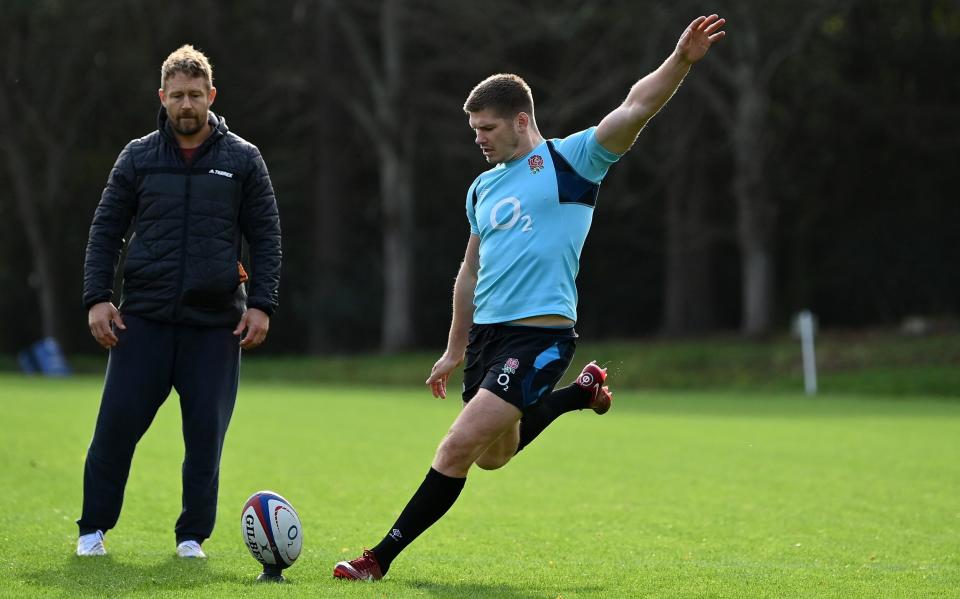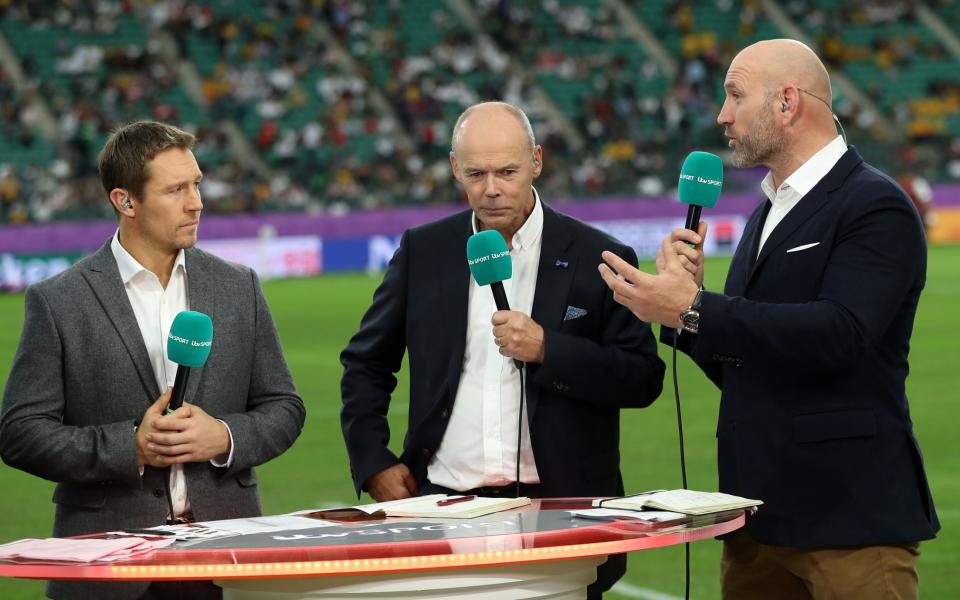Jonny Wilkinson interview: I am happy Owen Farrell will beat my record

So, Jonny Wilkinson, how does it feel to face losing one of the most distinguished records in English rugby?
That Wilkinson should look almost bemused by the question – “Honestly, you could ask, ‘how many points have you got?’ and I’d have no idea” – tells you plenty about a unique character even among the most obsessive giants of British sport.
The record in question is that of England’s highest points scorer, and Owen Farrell needs only two more against Samoa on Saturday to surpass Wilkinson’s tally of 1,179.
They are both almost three times clear of the next player – Paul Grayson – and, as Wilkinson would never say himself, it is perhaps worth mentioning he has played 17 fewer England games than the man poised to pass his record.
“They are just numbers but, when it represents enjoyment, embracing and engaging in the game, and feeling like your career is worthwhile, that’s what counts,” says Wilkinson. “It’s cool – I work with Owen, I know him reasonably well and it’s brilliant.”
As he spoke, Wilkinson was being flanked by his fellow ITV pundits Sir Clive Woodward and Lawrence Dallaglio who, once Wilkinson had disappeared into the night, confirmed there would be no false modesty in him having no clue about losing the record to a player he now mentors.
An earlier audience with just Wilkinson had proved fascinating. He was always an intense thinker as a player and, while certainly more at ease, the word ‘deep’ still feels somehow inadequate to describe an unerring air of focus and authenticity.
Take, for example, Wilkinson’s response to a fairly innocuous question about whether he approaches being a pundit with the famed rigour that makes him still the World Cup’s all-time record points scorer.
“I approach it with enormous diligence,” he says. “I’m interested in what it takes to perform, how you connect to that zone-like experience of total immersion in what you are doing. That’s my life. My absolute life. It’s the basis of all my relationships, the basis of what I do in my professional life…[to] just make the most of this gift we have of life. I cannot forget it for one second.
“I’ve been working my entire life to talk about what I’m talking about. Which is why I keep to what I know. My diligence is much more around the concept of the preparation and the experience of the playing and performing; the skills, the coming together and all the mental and emotional side. The statistical side I find interesting but I have always sided on the power of the human element: the creativity, the resilience, the ability to come through at any time when things connect. Therefore some things I find difficult.”
Such as?
“Predictions,” he continues. “To really convict yourself on a prediction means you are taking away people’s humanity… the ability of things to change on a sixpence. I’ve been involved in so many situations where things change hugely. It doesn’t need to follow that logical route of A plus B equals C.”
And could he feel that shift even during the chaos of a game?
“Of course… and sometimes in the opposite direction.” he says. “It’s not something where you say, ‘Do this’. You cannot create team spirit logically. It has to be liberating. It’s about an unknown of people just saying, ‘I let go’. And then someone else lets go. That unified goal, that united striving and purpose comes through and… bang! You get something that you cannot understand. That’s the beauty of sport.
“So it’s creating an environment. That is what we had with Clive [Woodward]. It can involve tough conversations, humbling learnings and massive surrenderings in relationships because when you are in the moment of the game, once no one cares about being recognised or who gets what, you start to have team spirit.”

The reference to the one-for-all ethos of that 2003 World Cup-winning squad inevitability brings us to his starring role in one of English sport’s greatest moments.
Exactly 20 years have passed since Wilkinson’s extra-time drop goal sealed victory in the final against Australia. While he can recount every moment of that famed kick – to the minutiae of subtly adjusting his right foot to allow for how the ball spun towards him – he describes such an immersed state of flow that it was like an out of body experience. “I have very little experience of what happened apart from observing it,” he says.
Had there been time to actually absorb the enormity of the moment, and what exactly he needed to do, Wilkinson thinks that he would have been unable to deal with the consequences. “My mind let go, and then all the work and all the dreams and desires just came into being,” he says.
So what, I wonder, would pundit Jonny, now aged 44, make of that younger self who could not just kick with the left-footed precision of Lionel Messi but tackle with the ferocity of an 18-stone back row forward?
“In that young man what I’d see is absolute expression,” he says. “But there was suffering involved… huge suffering. It was deeply honest. I couldn’t be another way. My purpose told me, ‘This needs to get done and the only way for it to get done is if you are like this’.
“What was exciting to me was, ‘Get out there and work harder. Get stronger’. Which means you have got to suffer. That’s what I found most exciting. I found suffering more exciting than I did joy. That was my joy. Suffering was my joy.”
“What resonates now with me is open up, be vulnerable, explore”
Stories of his meticulous practice routines, which could last for five hours at a time, have become the stuff of legend. But it was an approach which came at an intensity and cost that could not be indefinitely maintained.
And so Wilkinson evolved to enjoy a wonderful career finale in Toulon and now finds purpose in very different ways. He has a podcast all about human potential, as well as a natural drinks company, but he evidently still loves being around rugby players whether in a coaching or media capacity. As a player, he says he was usually unaware of external criticism but that the ITV work has helped him appreciate rugby’s wider ecosphere and how fans and the media have every right to strong opinions.
“As a player you can easily shut yourself off and be, ‘It’s just about us’,” he says. “Probably parents and family would be like, ‘Don’t worry what they said’ and I’d be ‘What did they say? I am worried now’. Some things were difficult to avoid, otherwise I never heard any of it. I was just too involved in what we were doing. That was how it had to be.”
Any assessment of Wilkinson then and now, however, surely keeps coming back to one question. If the 24-year-old Jonny simply had to approach life with such an all-consuming quest for perfection, could anyone else still hit such sporting heights with the outlook he has now?
“Of course they can,” he says. “You have got to be able to evolve with your passion and excitement at that time. If it resonates with you, and feels exciting and passionate, follow it.
“What resonates now with me is open up, be vulnerable, explore. If physically now I was able to play, and I tried to approach it in that way I did, I would burn out in a second. I wouldn’t last a day.
“I’m a different person to what I was then but I have the same drive and that’s my gift. The now, and what’s been is inevitable. The next moment is up for grabs. That’s the beauty of being human. I’m still playing my World Cup…it just looks different.”

 Yahoo Sport
Yahoo Sport 





































